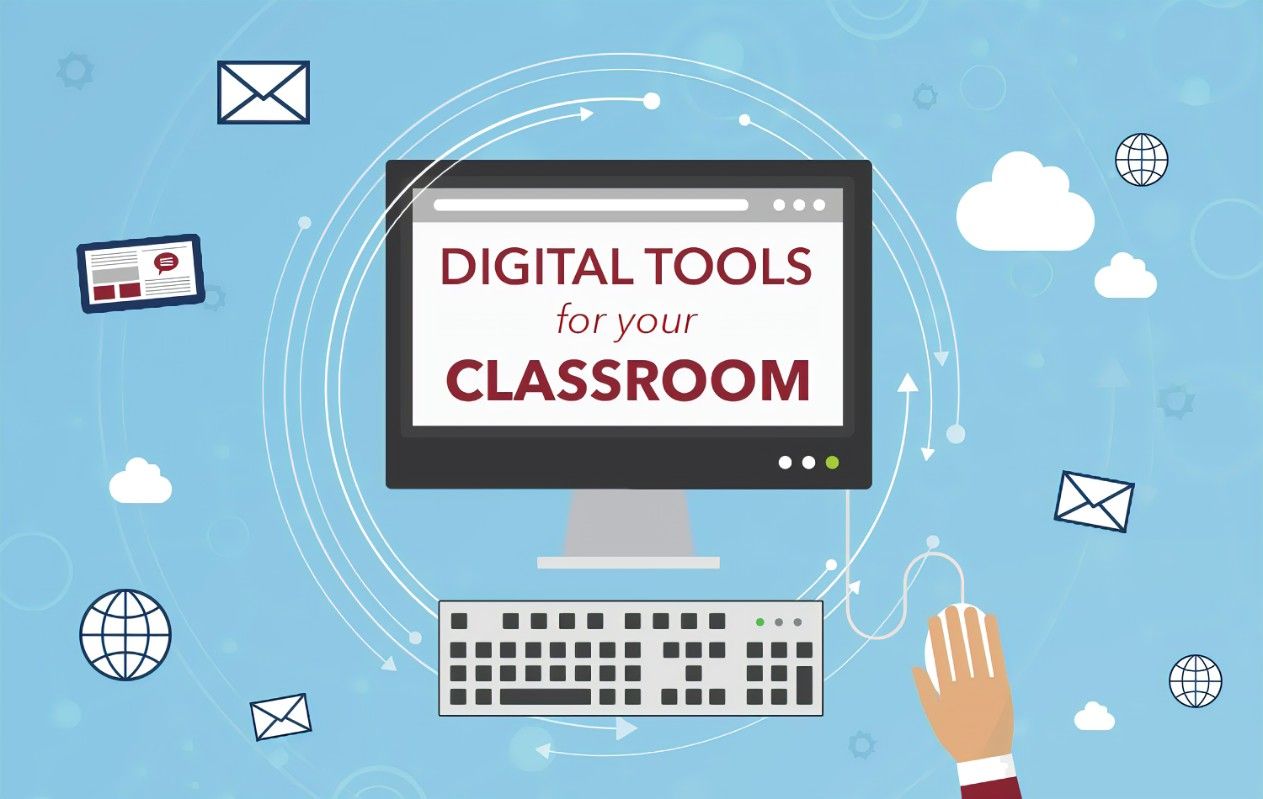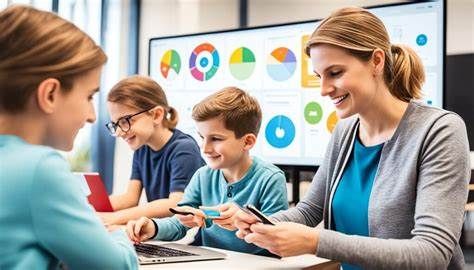Digital tools have revolutionized teaching and learning, offering educators and students a plethora of resources to enhance engagement and comprehension. From interactive whiteboards and educational apps to virtual reality simulations and online collaboration platforms, these tools cater to diverse learning styles and preferences. They promote active participation, facilitate instant feedback, and enable personalized learning experiences. With the integration of digital tools, educators can create dynamic lesson plans, tailor instruction to individual needs, and foster a more interactive and immersive learning environment. As technology continues to evolve, digital tools will undoubtedly play an increasingly pivotal role in shaping the future of education._1715612405599.jpg)


-
Digital tools in teaching and learning
"Empowering students through engaging education, fostering environmental consciousness, and advancing scientific literacy. Committed to shaping future leaders in Life and Earth Sciences."
-
Hi Saharudin,
Hope everything is going well. For my students with visual impairment I use Seeing AI app, it is an artificial intelligence application developed by Microsoft for iOS. With Seeing AI we use the device camera to identify people, objects, money, colors and then the app audibly describes those objects or characteristics for my students.
Also I use Reading Progress in Microsoft TEAMS, It is a free tool that helps my students practice their reading fluency and reading comprehension. Students read a passage out loud while recording video and audio, then send their recordings to me as their teacher. I love it!
We have a new technology called FarmBot, thanks to a Federal Grant. FarmBot is an open-source precision agriculture farming robot consisting of a cartesian coordinate farming machine, software and documentation including a farming data repository. The project aims my students to create an open and accessible technology aiding everyone to grow food and to grow food for everyone. It is amazing.
-
@BRYANb8875625e5 sounds great! Could you please provide us with the links to the tools you mentioned?
-
Sure! Here you have some links to find more information.
https://www.microsoft.com/en-us/garage/wall-of-fame/seeing-ai/
-
@Bousl2336873cb4
We are fantastically reimagining the increasing power of strong relationship between teachers and students. They grow together, learn together and co-design learning eniviroment. Teacher enrich their life experience by this supportive learning relationships. In other words, they need skill mastery and professional skills in building these relationships, especially with students whose life experiences may be quite different. And modern innovative technology can enable and accelerate these learning relationships between teachers and students and between students and other “learning partners” f.e. peers. Technology can also enable and accelerate the learning of every student. That's why teachers need support and CPD in adopting and implementing new pedagogical models. -
Hi,
Hope everything is going well. I completely agree with your perspective on the transformative impact of digital tools in education. Technology has undoubtedly revolutionized education. However, I also notice that our students are much quicker to adopt new technologies than schools are. This presents a significant challenge, as technology advances rapidly, often outpacing us as educators.For me it's crucial for us as teachers to remain open to new ways of enriching our curricula for the benefit of our students. By staying receptive to innovative teaching methods and integrating new technologies, we can continue to be relevant and effective in our educational roles.
Best,
Mr. Bryan -
Hi Bousl,
Hope everything is going well.I completely agree with you colleague. The impact of digital tools on our education nowadays has been transformative, providing both educators and students with a wealth of resources to enhance engagement and comprehension.
These tools not only encourage active participation in our classrooms and schools but also provide instant feedback and personalized learning experiences, making education more dynamic and responsive to individual needs. As technology continues to advance in our countries and communities, the role of digital tools in shaping the future of education will only grow more significant. Embracing these innovations is key to creating a more interactive and immersive learning environment for all our students.
Best,
Mr. Bryan -
How about introducing "Mystery Skype" sessions in your classroom? This activity involves connecting with another classroom somewhere in the world via Skype, but students don't know where the other class is located. They have to ask yes/no questions to figure out the location of the other class. Here's a detailed plan:
Mystery Skype Sessions
Objective:
Enhance students' geography, critical thinking, and communication skills by engaging in a virtual guessing game with another classroom somewhere in the world.Steps:
-
Preparation:
- Set up a Skype account and connect with a teacher from another school willing to participate.
- Schedule a convenient time for both classrooms to connect.
-
Introduction:
- Explain the rules of the game to your students.
- Emphasize the importance of asking clear, specific, and strategic yes/no questions.
-
Role Assignment:
- Assign roles to students, such as greeters, question askers, answerers, map keepers, and researchers.
- Each student has a specific job to ensure the game runs smoothly.
-
Pre-Game Research:
- Allow students to prepare by researching potential questions and familiarizing themselves with world geography.
- Create a list of good yes/no questions that can help narrow down the location.
-
The Mystery Skype Session:
- Connect with the other classroom via Skype.
- Begin the session with greetings and introductions from both classes.
- Take turns asking and answering yes/no questions to deduce each other’s location.
- Students use maps and research tools to keep track of clues and refine their questions.
-
Debrief:
- Once the locations are guessed correctly, both classes share information about their respective locations, cultures, and schools.
- Discuss what strategies worked well and what could be improved for future sessions.
-
Follow-Up Activities:
- Have students write a reflection on what they learned from the experience.
- Encourage them to research more about the other classroom's location and culture.
- Consider exchanging letters, videos, or projects with the other class to continue the cultural exchange.
Benefits:
- Geography Skills: Students improve their knowledge of world geography by actively using maps and research tools.
- Critical Thinking: The game requires strategic thinking to ask effective questions.
- Communication Skills: Students practice clear and effective communication.
Shazia Baloch
JEST Teacher
Address: Sindh Pakistan -
-
@BRYANb8875625e5 said in Digital tools in teaching and learning: Dear friend FarmBot is a revolutionary technology that has the potential to transform the agricultural industry. By combining AI, automation, and precision farming techniques, FarmBot can increase crop yields, reduce waste, and promote sustainable farming practices. As the global population grows, it is essential that we adopt innovative solutions like FarmBot to ensure food security while preserving the environment for future generations. i am so interested to use it.
Reading Progress in Microsoft TEAM
-
As the world is approaching to AI and robotics, I personally believe that the easiest way to teach the school kids is Gamification, through gamification we can grab the attention of the students by implementing some Audio Visual content.
Kahoot, padlet, word wall, Edpuzzle, Flipgrid and quizzes are the best gamification platforms. -
Digital teaching tools enhance learning experiences through interactive and engaging methods. These tools include:
-
Interactive Whiteboards: Facilitate dynamic lessons with multimedia content.
-
Educational Apps: Offer personalized learning experiences tailored to student needs.
-
Online Simulations: Provide practical learning experiences in various subjects.
-
Video Conferencing: Enable virtual classes and guest lectures from experts.
-
Learning Management Systems (LMS): Organize course materials and facilitate communication between teachers and students.
These tools enhance educational effectiveness by leveraging technology to create dynamic and immersive learning environments.
Shazia Baloch
JEST Teacher
Address: Sindh Pakistan -
-
Implementing biofeedback technology in classrooms could revolutionize how students engage with learning. Biofeedback devices measure physiological responses such as heart rate variability or brainwave patterns, providing real-time insights into students' stress levels and cognitive states. Educators can use this data to tailor learning activities, ensuring optimal engagement and learning outcomes by adjusting the pace, complexity, or environment based on individual needs and responses.
Shazia Baloch
JEST Teacher
Address: Sindh Pakistan -
In digital learning, the multimedia plays a crucial role in teaching. Like when we were in twelfth class, Teacher taught us the drama, "The Count of Marcerf" in lesson wise method. But when he set a media and showed on multi media, we got whole story easily.